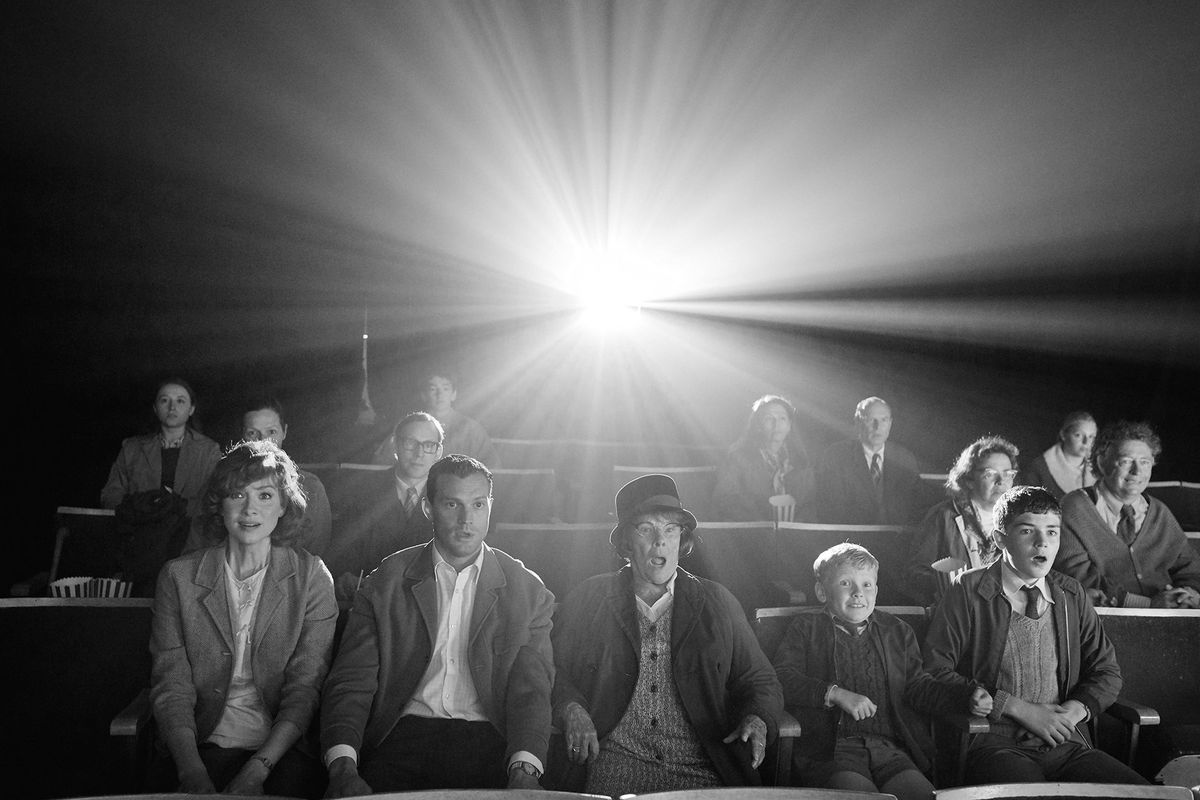Kenneth Branagh’s memoir ‘Belfast’ is touching, entertaining and utterly irresistible

For its frequently painful contours, there’s an abundance of pleasures to be had in “Belfast,” Kenneth Branagh’s semi-autobiographical film about growing up amid the troubles in Northern Ireland.
After a brief montage of the titular city’s present-day landmarks, the palette fades to black and white, and we’re on a noisy city street in 1969, when Buddy (Jude Hill) and his friends run ecstatically amok under the watchful eyes of the parents (their own and each other’s).
It’s a halcyon scene of postwar contentment (graffiti honoring hometown footballer Danny Blanchflower adorns one prominent brick wall) that is interrupted minutes later by an oncoming invasion: Almost instantly, the moment has turned into a nightmarish vision of rocks, clubs, firebombs and breaking glass.
The instigators, it turns out, are Protestants intent on terrorizing Catholic residents of a neighborhood where the two groups have lived happily together for as long as Buddy can remember. Now, he must learn to manage local thugs who, opportunistically glomming onto the volatile political realities, demand to know which side he’s on. (The right answer, an older friend advises Buddy, is whatever prevents getting “a deck in the gob.”)
Although sectarian strife forms the tense, often explosive background to Buddy’s coming-of-age story, it’s by no means the main event: His Pa (Jamie Dornan), who has been working construction in England, is nursing ideas about moving across the water permanently against the wishes of Ma (Caitriona Balfe), a glamorously beautiful homemaker who has been holding down the fort rearing Buddy and his brother and paying down her husband’s back taxes.
In addition to absorbing these grown-up anxieties – and being told he’s likely going straight to hell by the fire-and-brimstone preacher at church every Sunday – Buddy is nursing his first big crush, which hinges on impressing his beloved with good grades. But even homework somehow circles back to the escalating violence outside his rowhouse door.
While doing math homework with his grandfather Pop (Ciaran Hinds), the old man suggests Buddy approach the problem by spreading his bets. “But there’s only one right answer,” the boy insists. “If that were true, people wouldn’t be blowing each other up,” Pop retorts philosophically.
Such is the homegrown wisdom and wry comic relief that Pop and Granny (Judi Dench) can be relied on to provide throughout “Belfast,” which Branagh wrote by mining and meditating on his own childhood memories. Hill does a capable job of animating a typical 9-year-old boy’s passions and incipient desires – and the tensions that ensue when it comes to the enticements of pop culture and the judgments of religion.
But it’s the adults around him who make the most vivid and endearing impressions. Dornan, best-known for his work in the “Fifty Shades of Grey” movies, is particularly impressive as the pragmatic-minded Pa. Some of “Belfast’s” most moving moments come by way of its soaring language, which in Branagh’s deft hands turn otherwise dreary speeches into soaring spoken-word arias about the ineffable tug exerted by home, family, escape and self-discovery.
The narrative tension of “Belfast” might derive from whether Ma and Pa decide to move, but that’s the scaffolding for set pieces that bear the sharp ring of truth, such as when Buddy and his family instinctively pitch forward while watching the flying car in “Chitty Chitty Bang Bang,” or, later, when he’s caught up in a riot of looting at a local supermarket and triumphantly arrives home with a box of enzyme-powered laundry detergent.
That episode ends as most viewers will expect, both gratifyingly and terrifyingly so. As the portrait of a little boy sorting out right and wrong amid the moral confusion of war, “Belfast” joins a venerable canon, from John Boorman’s “Hope and Glory” to Taika Waititi’s “Jojo Rabbit.” Branagh has created a touching and genuinely entertaining addition to the list, guiding a terrific ensemble of actors and setting his entire vision to note perfect (and gratifyingly non-period) cuts from the Van Morrison discography.
If his instincts to please occasionally go a bit too far – a sequence set to the top 40 hit “Everlasting Love” is almost too cute – they generally hold him in good stead in a film that, in its final moments, manages to be both joyful and heartbreaking. If his recollections are to be believed, Branagh comes from a long line of sensitive, warmly amusing storytellers. With “Belfast,” he’s done them proud.